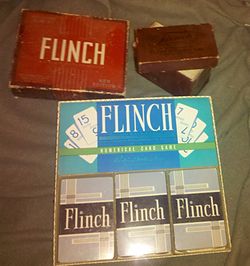Flinch - card game
The game of Flinch.
Flinch is a card game that was invented in 1901 by A.J. Patterson.
Patterson grew up on a farm in Eaton County, Michigan, and graduated high school at the age of sixteen. He moved from job to job in Grand Rapids and Chicago before he finally settled in Kalamazoo, Michigan as a bookkeeper at a stationery store, Beecher & Kymer.
At home one day while he was playing cards, he came up with the idea for Flinch. He decided to create the game and the deck. Later, he ran the Flinch Card Company out of the stationery store, that was renamed Beecher, Kymer, & Patterson.
About the game
Flinch is a card game that is based on stockpiling. The game is played with a custom deck and was first produced by the Flinch Card Company in Kalamazoo. This custom deck has 150 cards: ten sets of cards numbered from one to fifteen. Some variations use a deck that has 144 cards. Flinch is based on another game called "Spite and Malice".
Buying the game
Although it is not as popular today as it was when it was originally released, Flinch decks are still available online and in stores. Websites such as Amazon, Yahoo, and The Find all offer different versions of the deck. Some decks are vintage, from the original printing in 1901 and are being sold for around $40.00 while others are from re-prints or copies. These versions can sell anywhere from $4.00 up to $15.00.
Rules of play

Three different box designs
- The object of the game is to get rid of all one's cards. This game can be played with any amount of players. 1-8 is the suggested amount of players, but to play with more than 8 people, combine two decks of Flinch cards. The dealer deals each player 10 cards faced down, which is their stockpile. Next the dealer deals each player five more cards, but these cards are hand cards and are picked up and looked at by the players. The rest of the cards are dealt out in groups of five. These groups become the Stack. If there aren't enough cards to do groups of five, a draw pile can also be created.
- The first player turns over his/her top card and if it is a one, it gets placed in the middle of the table. If it is not a one, it is placed face up so all of the players can see it. The second player then takes their top card, and repeats the process. This continues until all of the players have played their top cards.
- The first player goes again, and if their face-up card happens to be a two it can be placed in the middle, on top of the one. If the face-up card is either one more or one less than another player's face-up card, the card can be placed on top of the other player's card.
For example, if the first player's face-up card is a seven, it can be placed on another player's six or eight. If the player is able to get rid of their face-up card in one of these ways, they turn up their next card and attempt to discard it using the same methods. This continues until the player is unable to discard any more cards. The next player does the same.
- Note that cards may be placed in the middle only in ascending order, starting at one and continuing to fifteen, whereas cards may be placed on other players' cards in either ascending or descending order.
- If the current player's turned-up card can be discarded, but the player fails to notice this, other players may yell "Flinch!".
Challenging("Flinch!"): On each turn players must first play from the Stockpile if possible. If they fail to do so, any opponent may call "Flinch!" Any player so challenged must stop playing immediately, draw the top card from the Stockpile of the opponent who issued the challenge, and place it at thebottom of his/her own Stockpile.
You may also challenge an opponent if you believe the opponent is holding a 1 card in his/her hand after it should have been played. If you are correct, the player challenged is penalized as above; if not, the challenger draws the penalty.
A player who is challenged and penalized ends his/her turn and does not discard to his/her Reserve Piles on that turn. If two players issue a challenge at the same time, the challenger nearest to the left of the challenged player receives the credit or penalty for the challenge.
Read more:
COMMENTS








 Three different box designs
Three different box designs